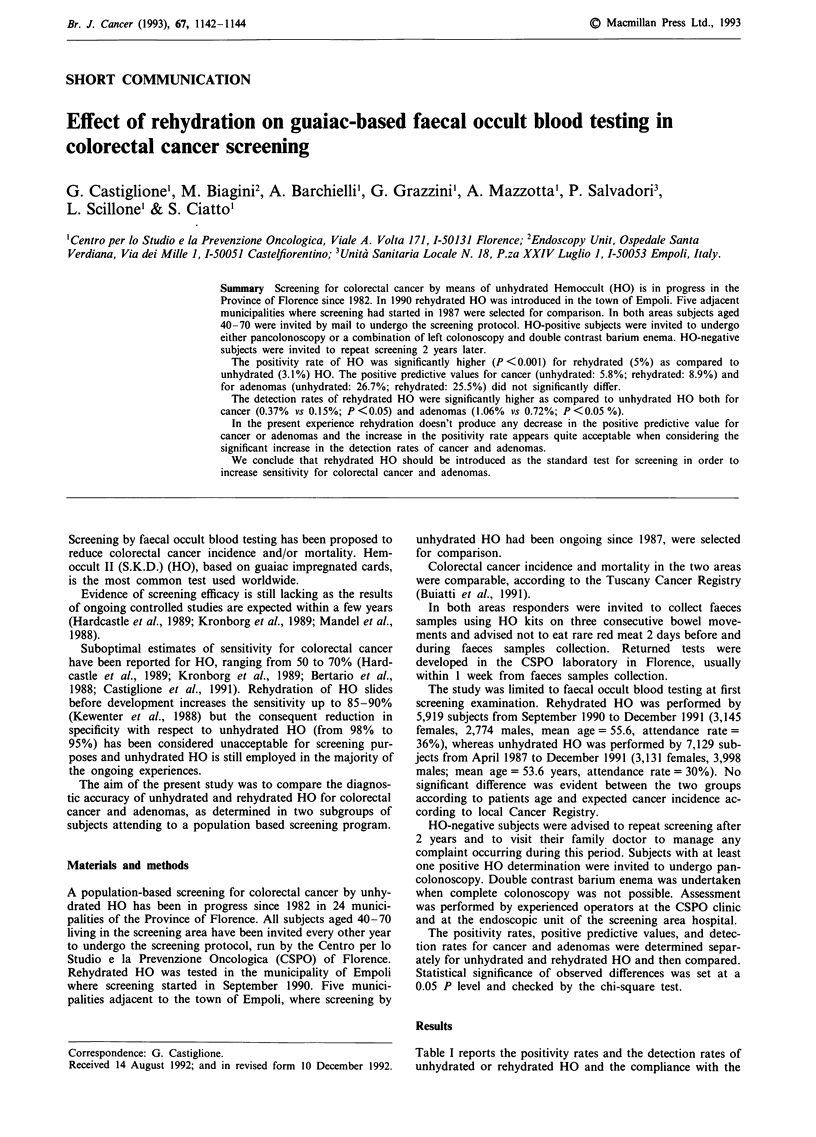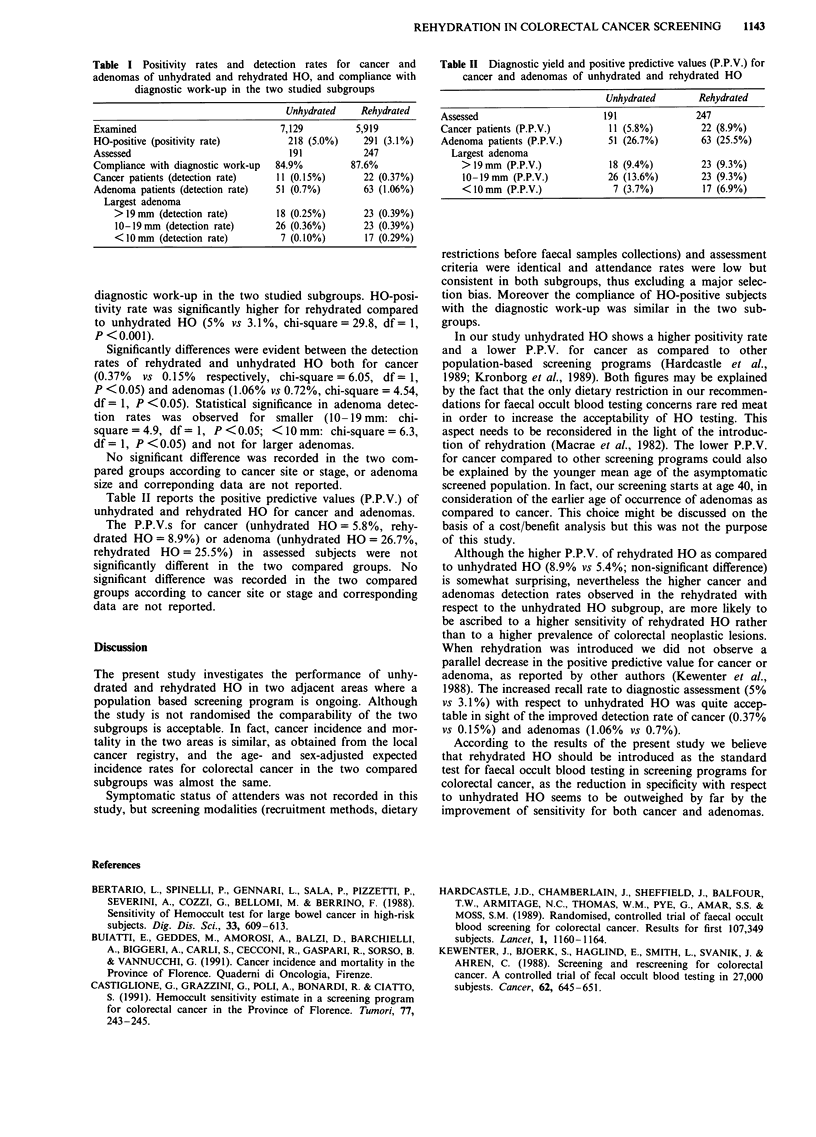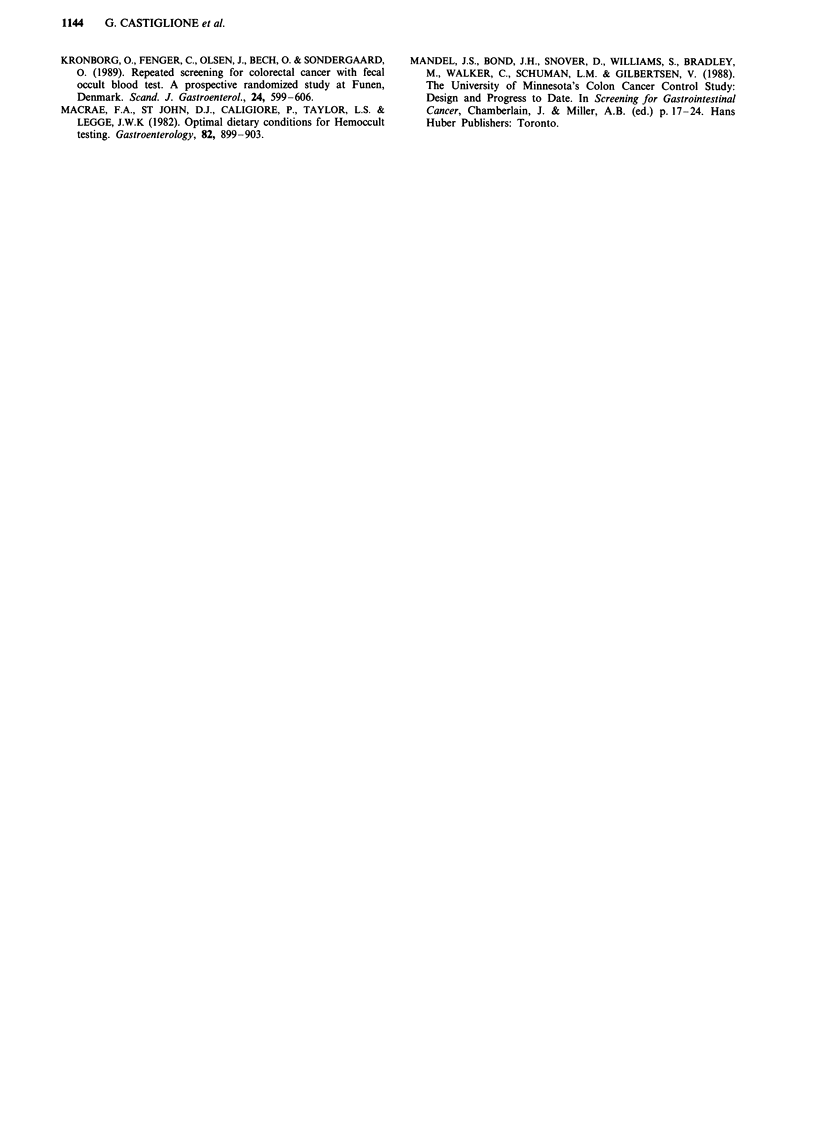Abstract
Screening for colorectal cancer by means of unhydrated Hemoccult (HO) is in progress in the Province of Florence since 1982. In 1990 rehydrated HO was introduced in the town of Empoli. Five adjacent municipalities where screening had started in 1987 were selected for comparison. In both areas subjects aged 40-70 were invited by mail to undergo the screening protocol. HO-positive subjects were invited to undergo either pancolonoscopy or a combination of left colonoscopy and double contrast barium enema. HO-negative subjects were invited to repeat screening 2 years later. The positivity rate of HO was significantly higher (P < 0.001) for rehydrated (5%) as compared to unhydrated (3.1%) HO. The positive predictive values for cancer (unhydrated: 5.8%; rehydrated: 8.9%) and for adenomas (unhydrated: 26.7%; rehydrated: 25.5%) did not significantly differ. The detection rates of rehydrated HO were significantly higher as compared to unhydrated HO both for cancer (0.37% vs 0.15%; P < 0.05) and adenomas (1.06% vs 0.72%; P < 0.05%). In the present experience rehydration doesn't produce any decrease in the positive predictive value for cancer or adenomas and the increase in the positivity rate appears quite acceptable when considering the significant increase in the detection rates of cancer and adenomas. We conclude that rehydrated HO should be introduced as the standard test for screening in order to increase sensitivity for colorectal cancer and adenomas.
Full text
PDF


Selected References
These references are in PubMed. This may not be the complete list of references from this article.
- Bertario L., Spinelli P., Gennari L., Sala P., Pizzetti P., Severini A., Cozzi G., Bellomi M., Berrino F. Sensitivity of Hemoccult test for large bowel cancer in high-risk subjects. Dig Dis Sci. 1988 May;33(5):609–613. doi: 10.1007/BF01798365. [DOI] [PubMed] [Google Scholar]
- Castiglione G., Grazzini G., Poli A., Bonardi R., Ciatto S. Hemoccult sensitivity estimate in a screening program for colorectal cancer in the Province of Florence. Tumori. 1991 Jun 30;77(3):243–245. doi: 10.1177/030089169107700312. [DOI] [PubMed] [Google Scholar]
- Hardcastle J. D., Thomas W. M., Chamberlain J., Pye G., Sheffield J., James P. D., Balfour T. W., Amar S. S., Armitage N. C., Moss S. M. Randomised, controlled trial of faecal occult blood screening for colorectal cancer. Results for first 107,349 subjects. Lancet. 1989 May 27;1(8648):1160–1164. doi: 10.1016/s0140-6736(89)92750-5. [DOI] [PubMed] [Google Scholar]
- Kewenter J., Björk S., Haglind E., Smith L., Svanvik J., Ahrén C. Screening and rescreening for colorectal cancer. A controlled trial of fecal occult blood testing in 27,700 subjects. Cancer. 1988 Aug 1;62(3):645–651. doi: 10.1002/1097-0142(19880801)62:3<645::aid-cncr2820620333>3.0.co;2-#. [DOI] [PubMed] [Google Scholar]
- Kronborg O., Fenger C., Olsen J., Bech K., Søndergaard O. Repeated screening for colorectal cancer with fecal occult blood test. A prospective randomized study at Funen, Denmark. Scand J Gastroenterol. 1989 Jun;24(5):599–606. doi: 10.3109/00365528909093096. [DOI] [PubMed] [Google Scholar]
- Macrae F. A., St John D. J., Caligiore P., Taylor L. S., Legge J. W. Optimal dietary conditions for hemoccult testing. Gastroenterology. 1982 May;82(5 Pt 1):899–903. [PubMed] [Google Scholar]


